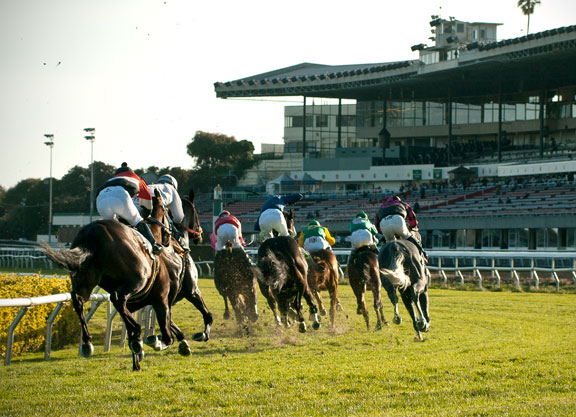By Dan Ross
At the Orange County Superior Court this Monday, judge Gregory Lewis ruled that the Pacific Racing Association (PRA)–the arm of The Stronach Group (TSG) licensed to operate the meet at Golden Gate Fields–must continue to send its audiovisual signal to the network of satellite wagering facilities in Northern California, thereby throwing a lifeline to the county fairgrounds where these satellites are primarily found, along with the broader status quo of the industry in the northern half of the state.
The crux of the issue surrounded PRA's legal obligation to contract with the northern fairs that operate as brick-and-mortar satellite wagering facilities if it withdrew from the Northern California Off-Track Wagering, Inc (NCOTWINC)–the organization which has provided the simulcast services to the Northern California satellite facilities for decades. Since June of 2018, the California Horse Racing Board (CHRB) has required that PRA contract with these facilities in return for being granted a racing license.
PRA has argued that the CHRB required this condition illegally. Indeed, at Monday's hearing, PRA's attorney, Richard Specter, argued that “no law” exists requiring the PRA to contract with these satellites if it doesn't utilize the services of NCOTWINC.
“There's no applicable statute that requires a racing association like the plaintiffs to enter into a contract with each satellite wagering facility” on condition of being granted a license, he said. “And this court does not make that finding.”
But on Monday, Judge Lewis formally ruled in favor of the defendants, comprising the California Horse Racing Board (CHRB), the California Authority of Racing Fairs (CARF) and the Los Alamitos Quarter Horse Racing Association. The latter relies heavily on the wagering made on its races sent as a signal through the Northern California satellites.
According to Drew Couto, who represented Los Alamitos in the matter, a ruling in PRA's favor would have had a profound impact in Northern California. “That was our fear–that was our concern. And it wasn't just in Northern California. That's the reason Los Al was involved,” he said. “It would also have had an impact on the Standardbred industry at night. The impact was quite broad.”
The decision follows Lewis's tentative ruling made last week, in which he stressed the knock-on effects on the industry as a whole if PRA were no longer required to send its signal to these satellite facilities.
“Plaintiffs' position that large racing associations need not contract directly with satellite wagering facilities affects various aspects of the horse racing industry, including the viability and/or profitability of satellite wagering facilities in Northern and Southern California as well as the racing association's ability to generate purses,” the judge had written in his tentative ruling.
“In addition, because Plaintiffs' position affects the viability of satellite wagering operations, it could also affect the California Authority of Racing Fairs, the individual racing fairs, labor, horsemen, and other statutory recipients of handle revenue,” he added.
A portion of the handle wagered over the internet on horse racing by California residents is distributed on a pro rata basis to Northern California satellites. In 2018, that amount was $2,879,935. “PRA maintains that if the satellites do not exist, that portion distributed to the satellites would largely inure to it, as PRA operates the predominant racetrack in the Zone,” wrote Drew Couto, in a prior court filing.
The issues at play were complicated–indeed, in a May 2018 letter, CARF executive director, Larry Swartzlander, wrote that PRA's withdrawal from NCOTWINC “also creates other concerns in regards to past liabilities, which total nearly $13 million.” Historically, the Fairs have funded about 25% of the organization and Golden Gate about 75%.
In his court filing, Couto had argued that TSG's ultimate aim is to control distribution of the signal in Northern California and to establish its own chain of satellites in that part of the state.
“Plaintiffs seek to divest and shut down the Northern California network of State and county owned satellite wagering facilities, purportedly to replace them with a chain of wholly owned, branded subsidiary internet wagering sites PRA refers to as 'ADW Cafes,'” he wrote.
“No other licensed racing association, authorized horsemen's organization, representative of labor, service provider, authorized agricultural district and/or racing fair, nor any members of the betting public has come forward in support of Plaintiff's Writ or position. None. Not one,” Couto added in the filing.
On Monday, Couto told the TDN that the court's ruling solidified consistency in the interpretation of both “the statutes and the rules for the past 30 years of practice” in California.
“And that is that the signal must be distributed to all of the satellites in Northern California, and wagers have to be facilitated in all of the satellites in Northern California, and it's going to continue,” he said.
Not a subscriber? Click here to sign up for the daily PDF or alerts.






